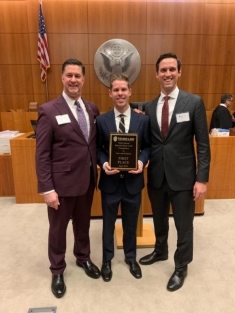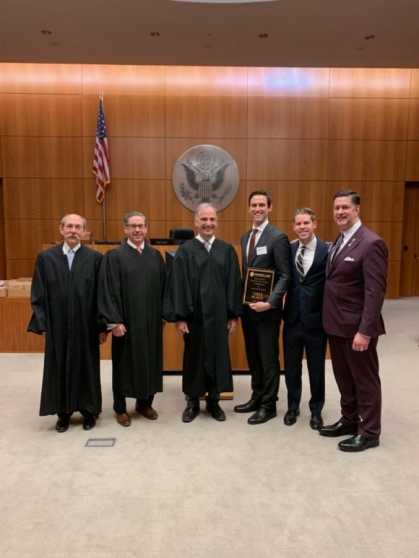Rutgers Law Wins Touro Law & Religion Appellate Advocacy Competition

Schaffhauser '23, and Brian Clark (2LE)
Rutgers Law’s National Appellate Advocacy Team won this year's Touro Law & Religion Appellate Advocacy Competition. Second-year part-time students Ralph Passante and Brian Clark bested 19 schools to take the top spot in this competitive tournament.
To win, the team was evaluated on their written brief, a U.S. Supreme Court brief, and their performances in five rounds of oral arguments against different teams and different panels of judges. The team defeated four other law schools throughout five arguments, including William & Mary Law School, University of North Carolina Law School, University of Chicago-Kent Law School, and Quinnipiac University Law School (which Rutgers defeated twice).
This year's problem involved an appeal to the U.S. Supreme Court that asked whether a state's decision to refuse to extend Individuals with Disabilities Education Act (IDEA) funds to private, sectarian schools violated the Free Exercise and Establishment Clauses. The team collectively wrote a 35-page brief, which included thorough analyses of the IDEA and implementing regulations, as well as a creative spin on recent Establishment Clause precedent.
The final round featured intense questioning from the Honorable Joseph Bianco (2d Cir.), the Honorable James Wicks (E.D.N.Y.), and the Honorable Jeffrey Cohen (N.Y.A.D.). The trio praised our advocates' responsiveness to the bench's questions and their ability to give cogent policy-based arguments. The judges also commended our advocates' passion and mastery of the case law. Judge Cohen commented that our advocates “really argued for [our] client.”
Collin Schaffhauser '23 and Eric Brislinger '23, both former appellate team members, helped coach this winning team. The team is selected through a competitive, try-on process and trains rigorously under the direction of coach Stephen Marietta '17.
“This team worked tirelessly to develop creative and client-centric arguments,” Marietta said. “Brian and Ralph mastered the intricacies of tricky First Amendment issues and turned in commanding oral arguments.”
